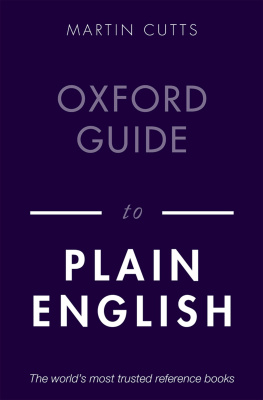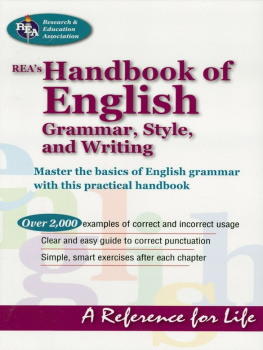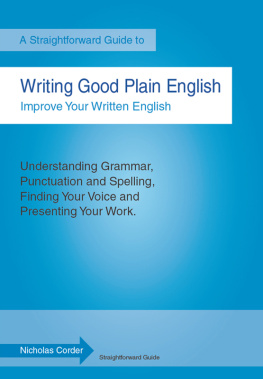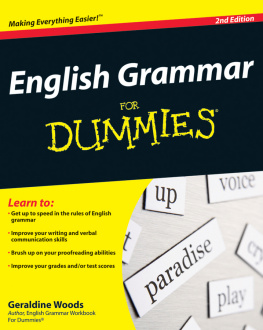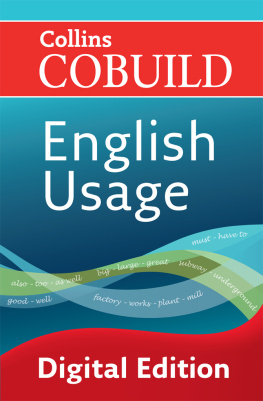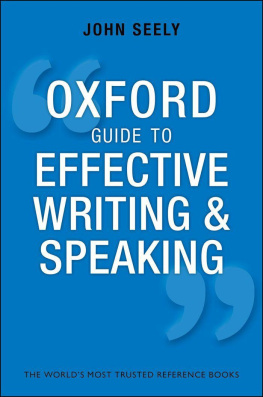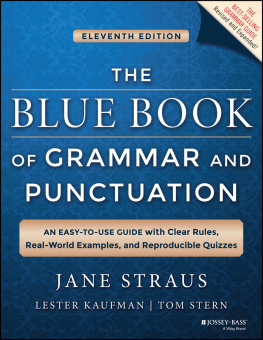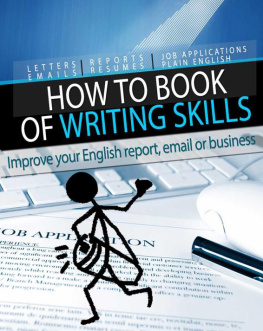My thanks go to those who have given help and advice on parts of this edition. and conducted several readability tests for me. Christina Gleeson, another Plain Language Commission associate, spent many hours extracting word-frequency data from the sources. I remain grateful to Monica Sowash, who ran the focus-group interviews for the original edition in 1995. Throughout, my wife Ingrid has given constant help and support.
The book is dedicated to my parents, Ivor and Joan Cutts; they raised me with an interest in words and gave unstintingly of their time and encouragement.
Several organizations have allowed me to include parts of their printed documents. Im grateful to the Local Government Ombudsman for an example in > with permission.
Martin Cutts is director of Clearest.co.uk Ltd, which owns the trading name Plain Language Commission. The company provides editorial and training services in the plain-language field and runs the Clear English Standard accreditation scheme for documents and websites. His books include Lucid Law (2000), Clarifying Eurolaw (2001), and Clarifying EC Regulations (co-author Emma Wagner, 2002), all available on free download from . At Liverpool University, he edited the student newspaper Guild and City Gazette (19734) and co-edited the creative arts magazine Sphinx. From 1974 to 1976 he edited Liverpool News, a paper for low-literacy readers. From 1976 to 1978 he edited the Salford Champion news magazine. He is the editor of Indlish by Jyoti Sanyal (Viva Books, 2006), and consultant editor to the Adult Learners Writing Guide by Ruth Thornton (Chambers, 2006). In 2013, he received the Christine Mowat Plain Language Achievement Award for outstanding contribution to plain language. He has appeared on BBC1s Watchdog and ITVs Martin Lewis Money Show as well as BBC Radio 4s You and Yours, Money Box, and Today. He co-founded the Plain English Campaign in 1979 and remained a partner there until 1988.
Whats the problem?
More than a century ago, the legendary Cambridge University professor Arthur Quiller-Couch encouraged his students to write in a clear style without inflated language. He liked plain English, he said, which he summarized as the difference between He was conveyed to his place of residence in an intoxicated condition and He was carried home drunk.
Quiller-Couchs advice remains relevant to todays academic, business, and official writers. During workshops, I often ask them to list the most desirable features of the reports, papers, and emails they have to read. Nearly always they say clear, brief, and easy to follow. They loathe foggy language because it obscures meaning and muddles the mind, and they dislike badly organized material because it takes time and energy to disentangle. But, as the workshops show, whats really hard is for writers to spot these faults in their own worksadly, we all have themand put them right.
As the book will explore, fog appears in many guises. Long and tedious examples abound, but here are a few short ones to begin with. First this highly abstract statement from a 26-page job advert for a police officer in Northamptonshire:
Our Chief Constable must be able to see beyond the horizons of convention to make the paradigm shift.
This style of writing is not trivial or accidental. It acts as a subtle invitation to join the jargonaut club at the top of the police force. Its sending applicants a coded message that a fluent command of fog is required for the post. It would be a brave person who came for interview and said, If you give me this role, Ill start by ensuring your job adverts are clearer than this one.
Visiting a school, I saw a notice in the reception area saying:
In the event of an emergency evacuation of these premises should you require assistance to facilitate your evacuation would you please advise your host or reception on arrival.
This exemplifies the widespread problem of posh, pretentious fog. Perhaps it could simply have said:
Visitors: if theres an emergency, will you need help to leave the building? If so, please tell reception or your host now.
A notice in the rear window of a minibus for disabled people also exceeded the usual inflations of official style, telling motorists:
Please leave sufficient space behind this vehicle to allow safe ingress and egress of mechanically propelled, seated position, ambulatory devices, by means of authorized lifting equipment thank you.
In more relaxed English, it could have said:
Leave us a gap!
Please leave at least 2 metres (6 feet) clear so we can lift wheelchairs in and out. Thanks.
In all these cases, my fancy is that the sinister Fog People, fluent speakers of Obscuranto, have influenced the authors to adopt over-formal language theyd never use in a face-to-face chat. The result is that simple ideas have become overdressed.
Of course, writing clear documents is much tougher for all of us than scoffing at poor ones. We have to think hard about what were going to say, why were saying it, and wholl be reading it. The reward, though, is that readers usually prefer the result. Probably they wont even notice, and thats one definition of good writing. This book aims to help you reach that goal more quickly.
Theres a daily trickle of legalistic fog. My postbag includes a companys acknowledgement of some money Ive sent it to invest, which says:

